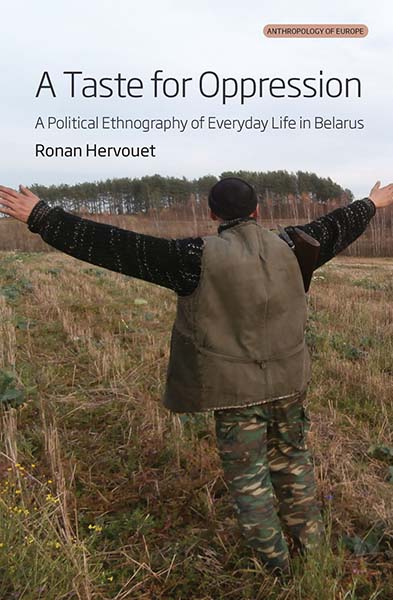Book Series of the EASA Europeanist Network
Anthropology of Europe
Published by Berghahn Books: see the series webpage on Berghahn's site.
News
The volume 6 of the series is out!
 Volume 6
Volume 6
A TASTE FOR OPPRESSION
A Political Ethnography of Everyday Life in Belarus
Ronan Hervouet
2021
Belarus has emerged from communism in a unique manner as an authoritarian regime. The author, who has lived in Belarus for several years, highlights several mechanisms of tyranny, beyond the regime’s ability to control and repress, which should not be underestimated. The book immerses the reader in the depths of the Belarusian countryside, among the kolkhozes and rural communities at the heart of this authoritarian regime under Alexander Lukashenko, and offers vivid descriptions of the everyday life of Belarusians. It sheds light on the reasons why part of the population supports Lukashenko and takes a fresh look at the functioning of what has been called 'the last dictatorship in Europe'.
Previously published volumes
Volume 5
PUNKS AND SKINS UNITED
Identity, Class and the Economics of an Eastern German Subculture
Aimar Ventsel
2020
Volume 4
IN PURSUIT OF BELONGING
Forging an Ethical Life in European-Turkish Spaces
Susan Beth Rottmann
2019
Volume 3
ALL OR NONE
Cooperation and Sustainability in Italy's Red Belt
Alison Sánchez Hall
2018
Volume 2
EUROPEAN ANTHROPOLOGIES
Edited by Andrés Barrera-González, Monica Heintz and Anna Horolets
2017
Volume 1
THE FRANCE OF THE LITTLE-MIDDLES
A Suburban Housing Development in Greater Paris
Marie Cartier, Isabelle Coutant, Olivier Masclet, and Yasmine Siblot
Translated by Juliette Rogers
Aims and Scope
The Anthropology of Europe book series is an initiative originating from the Europeanist network of the European Association of Social Anthropologists. Geographically the focus is on Europe; thematically we interpret anthropology broadly to include all aspects of human life in society. Naturally we welcome studies in the tradition of social anthropology, but interesting research is carried out under different academic labels – and the series will give equal weight to works from cultural anthropology, European ethnology, and national or regional traditions bearing alternative labels. The series is also open to interdisciplinary work that combines anthropology with other human and social sciences – including, but not limited to, history, demography and sociology – to tackle European themes of common interest.
The kinds of study we hope to publish include fieldwork monographs by young or established scholars, as well as collective or edited volumes on particular regions or aspects of European society. The series will pay special attention to studies with a strong comparative component – addressing theoretical questions of intere st both to anthropologists and to other scholars working in the general field of social science and the humanities.
Language of publication: English
Series management
The series is managed by two editors and an editorial committee, aiming at representing the major linguistic regions of Europe; and an editorial board comprising up to twenty-five senior Europeanists affiliated with academic institutions all over Europe and elsewhere. At present these are:
Editors
Patrick Heady, Max Planck Institute for Social Anthropology, Halle, Germany heady@eth.mpg.de
Monica Heintz, University of Paris Ouest, Nanterre La Défense, France monica.heintz@u-paris10.fr
Editorial committee
Andrés Barrera-González, Complutense University Madrid, Spain
Ulf Brunnbauer, Regensburg University, Germany
Anna Horolets, Warsaw School of Social Sciences and Humanities, Poland
Deema Kaneff, University of Birmingham, UK
Board Members (Pool of Reviewers)
Irène Bellier, LAIOS, Centre National de la Recherche Scientifique. France.
Regina Bendix, Göttingen University. Germany.
Michal Buchowski, Adam Mickiewicz University, Poznan. Poland.
Alexei Elfimov, Russian Academy of Sciences, Moscow. Russia.
Susan Gal, University of Chicago. USA.
Christian Giordano, Fribourg University. Switzerland.
Ralph Grillo, University of Sussex. United Kingdom.
Michael Herzfeld, Harvard University. USA.
Gabriela Kilianova, Slovak Academy of Sciences. Slovakia.
Ullrich Kockel, Heriot Watt University, Edinburgh.
Jon P. Mitchell, University of Sussex. United Kingdom.
Regina Römhild, Ludwig Maximilians University, München. Germany.
Cristina Sánchez-Carretero, Consejo Superior de Investigaciones Científicas. Spain.
Martine Segalen, University of Paris Ouest, Nanterre-La Défense. France.
Cris Shore, University of Auckland. New Zealand.
Petr Skalník, University of Pardubice. Czech Republic.
Elisabeth Vestergaard, University of Southern Denmark. Denmark.
Pier Paolo Viazzo, University of Torino. Italy.
Ulrika Wolf-Knuts, Abö Akademi. Finland
How to submit a proposal
Proposals for publication in the series should be sent to both editors via email. These initial proposals should include a title, abstract and table of contents for the planned book; as well as a short academic profile of the author/s or main editor/s.
The applications submitted will be assessed by the editors in consultation with the editorial committee and, where appropriate, by one or more members of the wider editorial board. If the editorial committee considers that the initial proposal might be suitable for the series, they will consult the publisher who will ask the author to fill in a Book Outline; and eventually to submit a PDF copy of the manuscript to be considered for publication. The final manuscript of the book submitted for publication will be assessed and reviewed anonymously by two scholars among the peer reviewers of the series and by a third scholar contacted by the publisher. Once the three readers’ reports arrive in the editorial office, the final decision as to whether a book is to be published or not will be made by the editors together with the publisher. At this stage the publisher will issue a contract with the author.
Books to be published in English will adopt the British-English style and spelling conventions as given in the Oxford English Dictionary, and more specifically for our purposes in The Oxford Style Manual (…). They will also follow Berghahn Books’ Book of Style UK and their Style Sheet for contributors.






